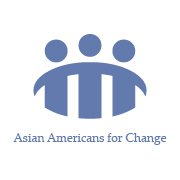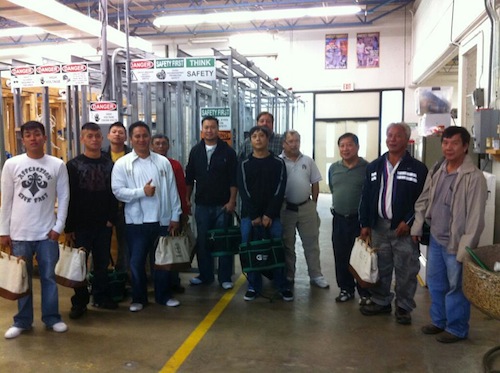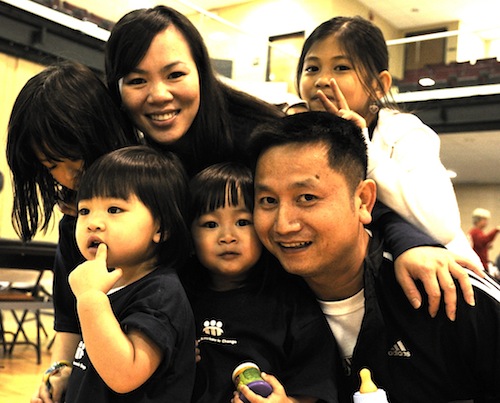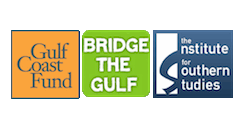Troubled Waters: Discussion with Thao Chi Nguyen on Creating Alternatives for Asian American Fishers in Mississippi
 After the BP oil disaster, Thao Chi Nguyen worked with Asian Americans for Change (AAC) to provide services and advocate for Asian American fishing communities along the Mississippi Gulf Coast. She spoke with Bridge The Gulf and the Institute for Southern Studies for the report Troubled Waters: Two Years After the BP Oil Disaster, a Struggling Gulf Coast Calls for National Leadership for Recovery. Nguyen discussed how the BP disaster is forcing changes on fishing communities, and how AAC is providing job training to help people make that transition. Nguyen is the former Community Program Coordinator at Asian Americans for Change.
After the BP oil disaster, Thao Chi Nguyen worked with Asian Americans for Change (AAC) to provide services and advocate for Asian American fishing communities along the Mississippi Gulf Coast. She spoke with Bridge The Gulf and the Institute for Southern Studies for the report Troubled Waters: Two Years After the BP Oil Disaster, a Struggling Gulf Coast Calls for National Leadership for Recovery. Nguyen discussed how the BP disaster is forcing changes on fishing communities, and how AAC is providing job training to help people make that transition. Nguyen is the former Community Program Coordinator at Asian Americans for Change.
Bridge The Gulf / Institute for Southern Studies: Tell us about the work you do with Asian Americans for Change.
Thao Nguyen: We advocate for Vietnamese and American fishermen, mostly Vietnamese community, non-English speaking, to bridge the gap between the Asian American and the American communities. A big number of them do not speak the English language and so they need us to advocate on their behalf to get resources and to get help, because of the disasters of Katrina and the oil spill.
BTG / ISS: Can you tell us a little bit about the community and the kind of people you work with?
Nguyen: We link the Asian communities together because they tend to move inward when there's trouble. They don't know how to reach outward. So it's hard for even us, to get in to help them.
BTG / ISS: What are some of the issues the communities been facing in the wake of Katrina and the BP disaster?
Nguyen: There are many homes that have not been rebuilt. They have mold and termites, and people are still living there and suffering from illnesses. They come to our office asking for assistance and we have to point them where to go. And they can't wait right now because everyone is suffering so badly. Then the fisherman, they don't speak English, so to get them into the mainstream workforce, it's hard because they have to learn that language. And that language barrier in the classroom makes them not want to continue. And so we're just slowly doing it, and we have graduated our first electrician class! They were on the first page of the Sun Herald in February. The classes are filling up fast.
BTG / ISS: Tell us a little bit more about what they learn?
Nguyen: We have a Vietnamese interpreter. He goes to the class with them, to teach them the steps, because the tests are in English. It's hard when you've lived 30 years in the fishing industry and that's all you know, and now you're forced through all these disasters to change with the rest of the world and learn how to use the computer, the internet, and all these new technologies. It's very difficult and some of them are very depressed and very sick from the oil spill, but the health care industry doesn't want to recognize that there's a health crisis out there right now. We're still suffering. We need more media attention in Biloxi and the Gulf Coast.
 Photo: Participants in the the Asian Americans for Chance electricians class, courtesy of AAC.
Photo: Participants in the the Asian Americans for Chance electricians class, courtesy of AAC.
BTG / ISS: Are you surprised at how little attention there is -- does it shock you in some way that more people nationally aren't aware?
Nguyen: Well it shocks me because of the fact that we're the poorest state to begin with and we've been through all these disasters and still we don't get enough attention. It's “oh, they're resilient, they'll get over it.”
BTG / ISS: Does your group work on the health care issues?
Nguyen: We have hosted several health resource fairs. Mostly we give free screenings to Vietnamese people because right now there's an outbreak in hepatitis B.
BTG / ISS: Some of the fishing's come back, but a lot hasn't. Are people going back to work?
Nguyen: No, they're just sitting by their boats, hoping and praying that the fishing industry comes back. I don't think it is. And they said the water is still very bad. So I think that these new classes that we're funding are a very good way to get people to get out there and learn something new. For the time being, even if they're not going to use it, to pep them up, you know? Because depression gets worse if you don't do anything about it.
BTG / ISS: And that was one one of the big things, right? That a lot of mental health issues people may not have wanted to talk about it before are now coming out.
Nguyen: Yeah, there's multiple layers of trauma and it keeps on building and these people. They need help now.
BTG / ISS: Are state agencies or anybody providing what people need?
Nguyen: It's not enough. We help with it, but they're not funding it enough to help these people. There are a lot of people affected by the seafood in this oil, and people have been in the water, tourists even, people who've done cleanup. There are fishermen out there every day on the boats. They're breathing it in. It's in the air.
BTG / ISS: How has the community changed from what you remember to now after all these disasters?
Nguyen: When you drive down the streets, the houses are all old and there are some that have been rebuilt. There are lots of vacant lots, and the streets are all dusty -- it's just like a wave of depression.
BTG / ISS: If you could tell the nation about what they need to know what would you say?
Nguyen: They need to come down here and see for themselves. Don't watch the news, don't listen to the media, listen to the actual people on the ground. These people, they're dying every day and the animals are dying. We have no jobs. It's depressing and if they don't get us help, it's just going to keep getting worse.
BTG / ISS: If you could just think of like one thing that you wish you could just change, if you could snap your fingers or get the President to do something what would you like to see happen?
Nguyen: Well, I like the idea of Dr. Mike Robichaux [who is running a detox clinic for people made ill by toxic exposure from the BP disaster]. Hold some type of conference where he could pull people from our community that are interested and give them a class or train them on how to set up these detox centers. We could open up a couple on the coast to help these people, because I think that even with jobs or money, health is the most important thing on that list. If you don't have your health you can't do anything. You don't have anything if you're sick and dying. Health is first. So, I think we need to get those clinics in as fast as we can.
 Photo: Kaitlin Truong, director of Asian Americans for Change, at an AAC health fair. Courtesy of AAC.
Photo: Kaitlin Truong, director of Asian Americans for Change, at an AAC health fair. Courtesy of AAC.
BTG / ISS: So what keeps you going, what keeps you motivated to keep doing what you do?
Nguyen: Well, when I look at my family and the people that need the help, and my boss, Kaitlin Truong, she's so motivating, she's a pharmacist, she saves all these lives, and then she still has to be head of the organization and during all the struggles that we have with the community she still holds her head high and she does her job. And that's what motivated me because she's like Superwoman. And me being a Marine, I'm Superwoman too, but when I look to her I'm like yeah, I'm not even going to compare myself. So that motivates me every day to continue, is to have that leadership.
 Interview conducted by Chris Kromm. The transcript has been edited for clarity and length.
Interview conducted by Chris Kromm. The transcript has been edited for clarity and length.
Read the Troubled Waters report from Institute for Southern Studies.
Read and watch more interviews with Gulf Coast community leaders.
 This content was produced by Bridge the Gulf Project and the Gulf Coast Fund for Community Renewal and Ecological Health, in collaboration with the Institute for Southern Studies.
This content was produced by Bridge the Gulf Project and the Gulf Coast Fund for Community Renewal and Ecological Health, in collaboration with the Institute for Southern Studies.
